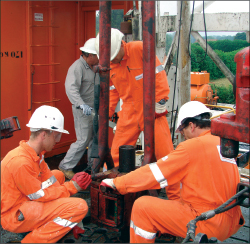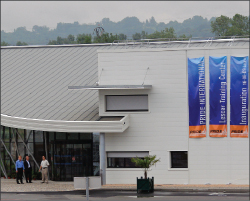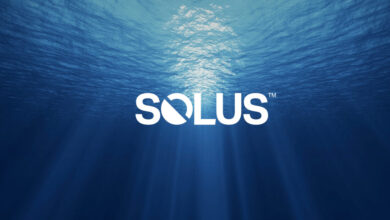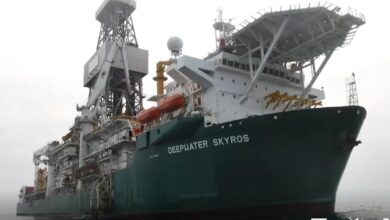Pride underscores training, safety commitment with new facility in France featuring rig, test well
By Mike Killalea, group vice president & publisher
Pride International’s commitment to training runs deep, a company culture in a land where learning runs back through the centuries. In the land where the Marquis de Lafayette reportedly trained, Pride International tore down its decades-old training center and there, like the proverbial Phoenix, arose a new and better facility.
 A rig on top of a test well at Pride’s Lescar training facility allows students to practice rig floor operations in a teamwork setting while under the watch of experienced instructors.
A rig on top of a test well at Pride’s Lescar training facility allows students to practice rig floor operations in a teamwork setting while under the watch of experienced instructors.
The new training center in Lescar, France, represents a 2 million euro investment, with 300,000 euros contributed by three local government agencies. The light, airy structure more than doubles the size of the original, with 1,295 sq m vs 609 sq m in the old, and five large classrooms and several small ones. The new facility also includes two dedicated spaces for well control and another for the full-size simulator, whereas the original facility had only a single combined well-control/simulator chamber.
For practical instruction, the center features an IDECO H35 rig atop a 928-m test well. Students can practice rig-floor and monkeyboard operations, as well as well control situations.
“Training has become so critical across our industry and this facility will be one of the best assets we have to better prepare employees for real-life drilling operations,” said Pride president and chief executive officer Louis A Raspino, speaking at the dedication ceremony. Mr Raspino serves as the 2009 vice chairman of IADC.
Several speakers representing regional, departmental and local government branches, including Lescar Mayor Christian Laine, also made addresses.
 The new facility more than doubles the size of the original. It now includes two dedicated spaces for well control and another for a full-size simulator.
The new facility more than doubles the size of the original. It now includes two dedicated spaces for well control and another for a full-size simulator.
“Furthermore,” Mr Raspino continued, “Pride is proud of the partnerships we have established with the local and regional governments that contributed to this center. We know that, in addition to training a highly skilled workforce, we also play a positive role in the local economy. We have always felt very welcome in Lescar and look forward to building on our positive relationships.”
Pride’s commitment to training extends beyond Lescar as well. The company will soon break ground on a new training center in Brazil, and plans are under way to expand training space in its Houston headquarters to meet ongoing needs.
The Lescar facility has seven permanent instructors, two with 35 years of experience with the company, and two former drillers with more than a decade of experience each. For example, René Robin boasts 35 years with Pride. He has instructed on drilling operations and equipment at Lescar for 2 ½ years and has previously served as a rig superintendent.
Mr Robin is also the chief custodian of what the school calls, tongue in cheek, the “museum.” This is the school’s varied collection of drilling equipment, including a BOP, for students to dissect and repair, tinkering that builds skills for the rig.
 Various drilling equipment are on hand for students to dissect and repair at Pride’s training center in Lescar, France.
Various drilling equipment are on hand for students to dissect and repair at Pride’s training center in Lescar, France.
The other senior instructor is Bruno Geoffroy, who’s similarly been with the company for 35 years and a former rig superintendent. Mr Geoffroy teaches safety and safety leadership, along with drilling courses for floorman to assistant driller. He has served as an instructor for six years.
Further, Dominique Dupuis, a well-respected drilling engineer and longtime member of the programme committees for IADC World Drilling and the IADC/SPE Drilling Conference, teaches occasional high-level courses, including drilling, deep subsea and well design.
Pride and its legacy company Forasol Foramer has operated the Lescar facility since the late 1970s. Training center manager Alain Jost credits Pride management for its vision and support in re-inventing the Lescar center.
According to Mr Jost, “The training center is fully equipped to deliver all the courses needed to operate the rig. We have everything here to run safety courses, drilling courses, and, of course, well control courses.”
 But not only the facility has improved. Pride Lescar recently achieved accreditation under the IADC Competence Assurance Accreditation (CAA) Program for seven job positions – assistant driller, derrickman, driller, floorman, night toolpusher, roustabout and toolpusher.
But not only the facility has improved. Pride Lescar recently achieved accreditation under the IADC Competence Assurance Accreditation (CAA) Program for seven job positions – assistant driller, derrickman, driller, floorman, night toolpusher, roustabout and toolpusher.
 CAA is designed to assure that company training programs meet accepted practices for training personnel in specific skills. More information about this program can be found online at www.iadc.org/competence/index.html.
CAA is designed to assure that company training programs meet accepted practices for training personnel in specific skills. More information about this program can be found online at www.iadc.org/competence/index.html.
Pride’s training center is also accredited under IADC’s WellCAP and IWCF.
Mr Jost said that some 500 students attended courses at the center during 2007 and 2008, for a total of 8,000 training days each year.
In addition to “standard” coursework, Pride designed two special programs to accelerate development of new personnel, one geared toward the management track and the second toward rig operations.
“This is a program that was started by Pride three years ago as a result of market demands for trained people,” Mr Jost said.
 Technical know-how is vital, but so is teamwork. To develop that invaluable intangible, Pride Lescar has designed a 2½-day stripping course. The exercise, in which a gas kick is controlled while tripping with the bit off bottom, is operated by the facility’s driller, derrickman and floormen, but the trainees give all the instructions and control the choke, trip and stripping tanks.
Technical know-how is vital, but so is teamwork. To develop that invaluable intangible, Pride Lescar has designed a 2½-day stripping course. The exercise, in which a gas kick is controlled while tripping with the bit off bottom, is operated by the facility’s driller, derrickman and floormen, but the trainees give all the instructions and control the choke, trip and stripping tanks.
To set up the exercise, compressed nitrogen is injected at the TD of the 1,000-m well, the gas-injection rate and pressure adjusted as desired.
“Our policy is to let the trainees lead the crew and manage the problem by themselves and learn from their mistakes during a post-exercise debriefing,” Mr Jost said. “They understand quickly that preparation, organisation and team work is the key for these exercises.
Normally, he added, the first exercise is difficult and nearly fails. But results improve significantly on the second run. By the third time, the team has the process down nearly perfectly. This despite a tricky additional challenge of also running an annular-to-ram procedure.
“This training course is the best we can offer, as it improves knowledge in a well control situation while tripping, forces the team to communicate, foresee operations and put a very good organisation in place,” explained Mr Jost.
Pride is also ready to help others in the industry, as well. Said Mr Jost, “We are ready to open our doors to external companies for their training needs.” DC
|
Click below for an exclusive interview with Pride International’s |




